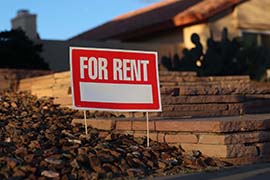- Slug: BC-CNS-Housing Discrimination,920.
- Photo available (thumbnail, caption below)
By Jacinda Palomo
Cronkite News
PHOENIX — Residents who have struggled with high rent in America’s fifth-largest city are calling on city officials to address discrimination against renters who receive public assistance.
Carla Naranjo, a coordinator with the nonprofit Unemployed Workers United, is urging the Phoenix City Council to pass an ordinance that would prohibit landlords from rejecting renters who rely on Section 8 housing vouchers and unemployment benefits for income.
So far, she has support from the new vice mayor, but work on an ordinance won’t proceed until the city is sure an ordinance banning source-of-income discrimination by landlords doesn’t violate state law.
“Source of income checks are often used to discriminate against tenants who would utilize Section 8 vouchers and other fixed-income sources,” Vice Mayor Yassamin Ansari said in an email. “This type of housing discrimination is a civil rights issue, and I would be proud to support an ordinance in Phoenix that prohibits this practice.”
In September, the Tucson City Council passed an ordinance that added “source of income” to a list of factors such as race and sexual orientation that are protected from discrimination by landlords.
Arizona’s then-Attorney General Mark Brnovich said the ordinance violated state law. Brnovich said the Legislature in 1992 said large cities and towns could enact fair housing laws, but they had to be approved before Jan. 1, 1995.
The Tucson ordinance has been on hold since, but Phoenix Mayor Kate Gallego, Ansari and others on the Phoenix City Council have asked Arizona’s new Attorney General Kris Mayes to allow Tucson’s ordinance to proceed.
“We are pleased that the Mayor and six council members signed a letter asking AG Mayes to reconsider a challenge to Tucson’s right to prohibit source of income discrimination, “ Naranjo said in an email. “However, our biggest challenge is the delayed decision from AG Mayes office on what will happen in Tucson, as this seems to be important for Phoenix council.”
Mayes spokesman Richie Taylor said the attorney general plans to address the ordinance, but he did not give a timeline. “As for when the Attorney General’s office will make a decision on the Tucson issue, we are aiming to do so promptly, but do not have a specific date,” Taylor said in an email.
Earlier this month, Naranjo was joined by residents who have dealt with housing income discrimination and other affordable housing challenges at a “Take Back Our Homes” rally near City Hall.
“Rent has been raised [a] minimum $200, $300 every year, and it’s folks that are on a fixed income, receiving any sort of public assistance, who are bearing the biggest brunt out of it since their income stays the same,” Naranjo said.
Miesha Fish, an American Civil Liberties Union member who attended the rally, has lived in Phoenix for more than 40 years and was finally able to secure housing with a Section 8 housing voucher, but she’s an example of how hard it can be.
“This process took three-and-a-half years to complete because of the extreme waiting period,” Fish said. “I would seek shelters and low-budget hotels until my check would run out, and then have to return to the streets for two to three weeks at a time.”
While being unsheltered, Fish said she was harassed by law enforcement, exposed to extreme heat and cold and had her belongings stolen.
“I would hide my belongings in bushes only to return with everything gone,” Fish said. “Even my husband’s ashes were stolen. I can’t tell you how horrible that was for me.
“We need to expand access to housing for people who are receiving public assistance, and we need council members and the mayor to ensure that the most vulnerable are not harassed or discriminated against,” Fish said.
In Phoenix, the Section 8/Housing Choice Voucher program, funded by the U.S. Department of Housing and Urban Development, helps subsidize participants who pay about a third of their monthly income for rent to a private landlord. Vouchers pay the remaining balance on the rent. The waiting list for the voucher program is currently closed, according to the city’s housing department website.
Ansari said that the city is struggling to house a growing population and acknowledges both affordable housing and homelessness are major issues that need to be addressed.
Arizona’s population grew by almost a million from 2010 to 2022, and 12.8% of the state’s more than 7.36 million residents live in poverty, according to the U.S. Census Bureau. In Phoenix, 15.4 percent of the city’s more than 1.6 million residents live in poverty.
“Our biggest obstacle is that we do not have enough housing units to keep up with our explosive population growth over the last few years,” Ansari said in an email. “By some estimates, we are short nearly 100,000 housing units. That’s a massive issue that compounds all other issues regarding affordable housing.”
When it comes to homelessness, Ansari said shelter capacity was increased by nearly 600 beds in 2022. In the upcoming fiscal year, she hopes the city will add another 800 shelter beds, many of which will be flagged as priority access for people living in “The Zone” — a section of downtown Phoenix in which thousands of homeless people have set up camp.
In Arizona, just over a fifth of all renter households are considered “extremely low-income,” according to the National Low Income Housing Coalition. A four-person extremely low-income household has a maximum annual income of $26,200, while it takes an income of $48,747 to afford a two-bedroom rental home, according the coalition.
For more stories from Cronkite News, visit cronkitenews.azpbs.org.
^__=
Residents who have struggled with high rents in Phoenix are calling on city officials to pass an ordinance that would prohibit landlords from rejecting renters who rely on Section 8 housing vouchers and unemployment benefits for income. (Photo by Paula Soria/Cronkite News)
